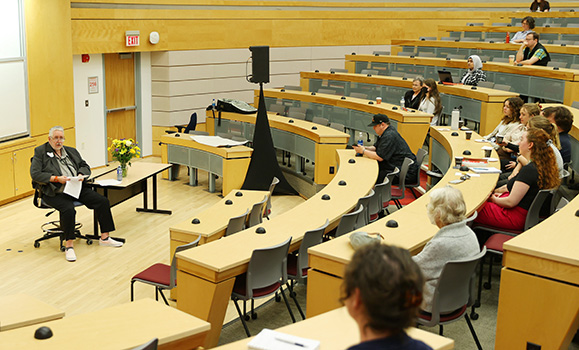On the afternoon of Thursday, May 30, the day before he was to be awarded an honorary degree from ļŕŃŌ≥‘ĻŌÕÝ, Dr. Austin Mardon held court in the Scotiabank Auditorium of the Marion McCain Arts and Social Sciences Building, delivering a public lecture on the stigma of mental illness and his life and career since being diagnosed with schizophrenia in 1992.
An author, explorer, and mental health advocate who was awarded the in 2006, Dr. Mardon spoke for 25 minutes before taking questions from those in attendance, some of whom discussed how their lives have been impacted by mental illness.
Early life
Growing up in Lethbridge, Alberta in the 1960s, Dr. Mardon‚Äôs mother was diagnosed with schizophrenia when he was five years old. ‚ÄúWhile the earliest memories many of my friends have of their mothers are warm and fuzzy, one of my oldest memories was seeing my mother in a straitjacket,‚ÄĚ he recalled. Growing up in a town where ‚Äúeveryone knew she was ill,‚ÄĚ Dr. Mardon said he was bullied in school because of her condition and frequently left alone to care for her while his father, a medieval studies professor at the University of Lethbridge, was busy.
Having witnessed schizophrenia‚Äôs impact, Dr. Mardon feared the worst when he was diagnosed with the disorder in 1992. ‚ÄúThe stigma I lived with my whole life made me believe that when I was hospitalized with schizophrenia, my life was over,‚ÄĚ he said. ‚ÄúThankfully, I was wrong about that. I can still stand here today and publicly say that I have schizophrenia.‚ÄĚ
 Őż
Őż
While he excelled in academia following his diagnosis, earning a PhD in geography from Greenwich University in Australia, the stigma of mental illness remained ever-present in his life. ‚ÄúIt was common for my research partners to suddenly break off communications when they found out about my illness,‚ÄĚ he said. ‚ÄúEven if I was capable of being a full professor, I doubt any institution would have been willing to hire me ‚Äď although that may be different now.‚ÄĚ
Those suffering from mental illness may also not want to believe it themselves. ‚ÄúWe delude ourselves into thinking we aren‚Äôt sick,‚ÄĚ Dr. Mardon said. ‚ÄúMany would rather be homeless than admit they have a mental illness and seek appropriate medication.‚ÄĚ
More education is needed
Dr. Mardon said that medication has improved his quality of life, but the only way to fight the stigma of mental illness is ‚Äúeducation, education, and more education.‚ÄĚ
‚ÄúIt‚Äôs almost as if we have to learn to forgive ourselves for being ill,‚ÄĚ he said. ‚ÄúMy wife says that all she expects from me is to live as healthy and happy a life as I‚Äôm capable of. Now I just have to give myself permission to be content with that.‚ÄĚ

